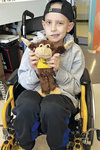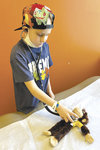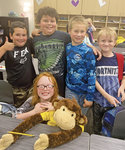



Sometime around Christmas 2021, Evergreen Elementary School second-grader Brayden VanderDoes lost his appetite.
Then he began to vomit. Every day.
In the coming weeks he lost his energy and balance. He couldn’t even ride his bike.
Then he began seeing double.
“We were going through all kinds of doctor appointments to try and figure out what was going on,” said his mother, Amy. “He had X-rays and endoscopies and blood work, and he’d come to school and just feel so sick.”
“And I did not like that,” Brayden said.
He had a CT scan that December, which showed nothing unusual. After five months without headway, a doctor ordered an MRI scan of his skull.
“We thought we were just going to go in, get an MRI, and wait for a couple days for answers,” Amy said. “But that’s not what happened.”
Brayden went immediately from the MRI at Mary Bridge Children’s Hospital in Tacoma to Seattle Children’s Hospital and underwent brain surgery that night.
“We had to stay a long time,” he said.
Brayden was diagnosed with medulloblastoma (muh-dul-o-blas-TOE-muh), an aggressive pediatric brain cancer that starts in the cerebellum, which governs muscle coordination, balance and movement. While rare, striking just 500 children in the U.S. each year, it is the most common cancerous brain tumor in kids, who have a 70% survival rate.
Brayden had just turned 8 years old.
He missed the end of second grade. Instead of enjoying field day, moving-up assemblies, and other end-of-year festivities, he spent five weeks in the hospital enduring four surgeries and intensive inpatient rehabilitation to relearn how to walk and talk.
“It’s like I was a big baby,” Brayden said.
Then there was six weeks of radiation therapy five days a week while simultaneously doing chemotherapy.
He lost all his hair. But so did his dad, Martin.
“I got to shave it all off,” Brayden said. And Dad kept it off until Brayden’s started to regrow.
“For the kids that are getting radiation to their head, they get a mask that molds to their face and locks to the table,” Amy said. “It’s not a very fun thing and they say that even adults that go through it have panic attacks because it’s so hard.”
One of Brayden’s doctors paints those masks for kids as their favorite superhero or cartoon character. Brayden chose Munchlax, a Pokéman character that was his first stuffed toy. He trained with the mask in a simulator, preparing for the day.
“For all his MRIs and the different X-rays, he’d usually have to get sedated because it was a pretty scary experience going into those big machines,” Amy said. “For radiation, that would be sedation five times a week for six weeks; it adds a lot. We were really trying to work toward getting him to do it without sedation.”
When the moment came, Brayden decided he was going to do it without sedation.
Until he got to the real machine.
“And I was like, ‘Nope!’ ” he said. The simulator did not look like the actual radiation machine, it was a little scarier.
“It was ginormous,” he said.
And then Dad had a brilliant idea.
“He said if you do this, I’ll give you $50,” Brayden said. “And I said no.”
Then Dad pulled a special $100 bill out of his wallet that his dad had given him, and that he had kept for many, many years. He held it in front of Brayden’s face and said if you can do this, this $100 will be yours.
“And I’m like, ‘Done,’ ” Brayden said.
He made it through all 30 radiation sessions without sedation. “Pretty soon, he got so familiar with the process he’d pretty much get there, run to the room, run to the table, and say let’s get it over with,” Amy said. “They’d never seen another kid running to get their radiation done.”
The family stayed at Ronald McDonald House at Children’s for the duration, where Brayden met a 6-year-old boy also undergoing radiation treatment.
“He was having to get sedated every single time until he met Brayden, and they got to have a big talk about what it was like to do it without sedation,” Amy said. “After that, he was able to do it without sedation too.”
“Because he heard about the $100,” Brayden said.
The beginning of Brayden’s third-grade year at Evergreen was approaching, and he wanted to return to school, where Amy has worked as a secretary for three years.
“He really, always wants to be at school,” she said. “He doesn’t want to miss out on anything.”
But his treatment took a toll on his little body. He learned how to walk again without assistance, but he was unsteady, he lost weight, his face was partially paralyzed from surgery, he had lost all his hair, and he fatigued quickly. His parents had concerns about him going back to in-person school, even with Amy there, including that other kids would not understand. They might be afraid of him and not want to be his friend.
This is where the monkey comes into the story.
“His name is Buddy, and he does all the work for me when I’m gone,” Brayden said.
A big stuffed monkey sits in Brayden’s chair when he is absent and participates in all student activities, taking his place in class. His classmates help the monkey do anything Brayden would have done that day. It’s a program promoted by Children’s Hospital called Monkey in My Chair, created in honor of Chloe Watson Feyerherm for children who miss school because of cancer.
“It was a little bit overwhelming not knowing what he would need throughout the year,” said his teacher, Alena Shepard, now in her second year of teaching. “But I think he really enjoys learning. If I’m up there talking, he is looking directly at me, he is not distracted by anything, he’s soaking everything in, he does everything the first time I ask, and does the very best on all his work.”
The monkey makes a difference to the class. Brayden carries a smaller version of Buddy when he has to miss school, and exchanges messages with his classmates so they can let each other know how Buddy is doing.
“They take it very seriously, taking it everywhere they go and making sure he’s doing his work for Brayden,” Shepard said. “They can definitely tell what it represents.”
“He’s a super tough kid,” said Dean of Students Christy Dalby. “The monkey has really helped keep him in the forefront of their minds when he’s not there. The monkey is Brayden, so Brayden gets to go to music, to science, to recess. It’s keeping him in their thoughts.”
“It’s incredible,” said Bethany Grace McDermott, the Evergreen counselor. “I think them being part of this journey has made a huge difference for the kids. They all want to hang out with him.”
At press time Brayden was in the middle of his fourth of eight cycles of chemotherapy. He said he’s feeling good because he’s halfway done.
“In my lunch groups (with kids) I usually start off asking them for a rose, a thorn and a stem,” McDermott said. “The rose is something great that happened that day or that week, the thorn is something not so great, and the stem is what you’re thankful for. And so many times Brayden would share his rose, and he would say ‘I don’t have a thorn.’ If anybody has a right to have a thorn right now … I know he doesn’t feel good, he doesn’t have a lot of energy, and he’s saying I don’t have a thorn, and I just thought what an inspiration to not only other kids but to adults.”
“I wanted to share this story because Ms. Shepard and her class have really gone above and beyond to help my little boy through a tough situation that no kid should ever have to face,” Amy said. “Sending Brayden back to school was a terrifying decision for so many reasons, but it was the right decision because of them. I will forever be grateful.”
When KP News asked Brayden what readers should remember most about him and learn from his story, he didn’t hesitate.
“One hundred dollars,” he said.
UNDERWRITTEN BY THE FUND FOR NONPROFIT NEWS (NEWSMATCH) AT THE MIAMI FOUNDATION, THE ANGEL GUILD, ADVERTISERS, DONORS AND PEOPLE WHO SUPPORT INDEPENDENT, NONPROFIT LOCAL NEWS